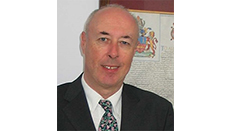60-second interview: Tim Clark
 Tim Clark is a CIEA Fellow and Councillor for Europe for the Royal Institute of British Architects. Previously Research Fellow at the University of York, author of some 200 papers and articles and holder of professorships at QUB and Yaounde, he is currently leading teams on the design of transportation hubs, based in Murnau Bavaria as an independent partner of Deutsche Bahn. He continues to run events and conduct research in the field of continuing education, currently focusing on Open Peer Review.
Tim Clark is a CIEA Fellow and Councillor for Europe for the Royal Institute of British Architects. Previously Research Fellow at the University of York, author of some 200 papers and articles and holder of professorships at QUB and Yaounde, he is currently leading teams on the design of transportation hubs, based in Murnau Bavaria as an independent partner of Deutsche Bahn. He continues to run events and conduct research in the field of continuing education, currently focusing on Open Peer Review.
What is your role in assessment and how long have you been in this role?
My role in assessment centres on the evaluation of learning outcomes for self-directed enquiry and experimentation, mainly at postgraduate and mid-career level. I have always been interested in the process of what we call “learning” since discovering at school that there was a “formula” to preparing for and passing examinations, only to realise that this had nothing to do with retention and self-development. The really important bits of learning that I encountered were those that required me to defend, explain or apply assumed facts when challenged in a live situation. I started to do that at College and University. My professional life as a facilitator of learning started firstly as a volunteer organiser of meetings and events for architects on the Isle of Wight. Then after five years of designing buildings for the County Council, in which I regularly assessed the suitability of projects and proposals, I moved into a full-time job that was advertised in 'The Times' as “designing education for architects” and led the development of mid-career services to support and evaluate the performance of teams responsible for the design and management of hospitals and related facilities.
What are the rewards and challenges of your job?
This question contains a number of unconsciously biased assumptions centring on the idea of having a “job”, which I can happily address in my response. My main rewards have been to see under-performing and often demoralised workers rediscover their self-confidence and motivation. The passive assumption of the right to a permanent job, a salary and personal rights and privileges all distract from the main driver of learning in an evolving dynamic society, namely synergy between contributing elements. Learning is not about self-advancement per-se, it is about being part of a connected collaborative community that offers mutual sharing and support toward collective advancement, in which each actor has a continuing sense of achievement and value. Loss of confidence and lack of motivation can creep in at any age and are a huge challenge to overcome but the rewards of enabling an individual to become an independent and contributing part of corporate performance are more than worth the effort. The biased assumptions in this question are thus part of the problem/challenge that I have made it my job to address.
What would you change about the assessment and qualifications system if you could?
Perhaps most aptly described by the York University Language Teaching Centre’s Peter Green as “the heavy hand of examinations” I would like to change the culture of “marking” and “grading”, which not only lock individuals into a series of cul-de-sacs but they fail to acknowledge the diverse and dynamic capacity of the human brain. We in the field of design education tend to use an inverted pyramid in which creative ability / design activity are used as drivers of learning on a need-to-know basis. My esteemed colleague at the university of York, the late Professor Eric Hawkins insisted that the two drivers of learning are need-to-know and pattern-recognition. My other late colleague, Professor Patrick Nuttgens insisted that learning is only possible when there is a purpose. By harnessing these principles, learners of all ages can quickly access subordinate knowledge and learn on a lasting basis, by doing or replicating what they might have heard or seen.
Why are you a member of the CIEA?
CIEA is the only professional institution that, at least on the face of it, is committed to advancing the process of “assessment”. We all know what “assessment” means and in the context of CIEA it has a particularly tight relationship to the UK school system from the ages of 5 to 18. However, I can see that there is both interest and willingness inside CIEA to broaden the scope of assessment to include recognition, self-regulation and performance. My current quest is to unite the worlds of research (discovery), development (acquisition) and performance (application) and I am concentrating on the value of open peer-review of each of these aspects. Essentially learning is about performance and all other processes are subordinate to this goal. The revised Bloom pyramid, where creativity takes over as the highest indicator of performance is perhaps a glimmer of hope. The transition from the passive ordering of classes of children into a creative community of happy collaborators will not be easy but the most important steps are already being taken in and around CIEA and that is why I am still a member.

